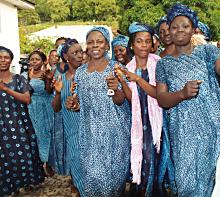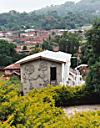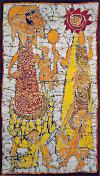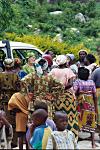| Road
Travel: All of your travel within Nigeria is provided in air-conditioned cars and vans. You schedule your travel to suit your needs (please keep in mind that all travel between cities should be done in daylight). Nigeria can be daunting to a newcomer, so Nike and her staff will be happy to accompany you as you shop, run errands, visit museums or just wander about the town.
Cost and Payment: The basic cost of a two week tour including room, board and all transportation within Nigeria and a guide or teacher is $1000 per person. Shorter visits, longer visits and group rates can all be
negotiated.
General Notes on Travel in Nigeria
Communication: You will always be reachable by mobile telephone. Telephone service is expensive in Nigeria, however, and we suggest that you arrange to have people call you, or take advantage of the internet telephone services in Lagos, Oshogbo and Abuja. Oddly enough, a call to the US through the Voice Over Internet Protocol normally costs 30 naira a minute, while phone calls within Nigeria cost 40 naira per minute. Internet service is available in cafes for $2-3 per hour.
Money: At this writing, one dollar is equal to 137 naira. The currency floats, and you can change dollars either at bureaux de change or at occasional informal currency markets.
Remember that credit cards should not be used in Nigeria. You should bring enough cash to pay for any shopping or excursions you might wish. With advance notice you can arrange to deposit money in the US and have it available in naira when you arrive in Nigeria. As the Nigerian currency is bulky (the largest denomination is equivalent to about $3.50) you may wish to draw on these accounts in small quantities.
Medical Care: Consult your personal physician before planning a visit to Nigeria. Malaria is endemic in Nigeria, and malaria prophylaxis can only be taken under the supervision of a physician acquainted with your medical history.
Security: As you prepare for your journey, friends and acquaintances may look at you like you are crazy for planning a visit to Nigeria. Nigeria has a fearsome reputation, and we have to admit that reputation is not entirely
undeserved. We don't want to minimize the difficulties of living and traveling in Nigeria, and we urge you to read advisories on travel to Nigeria from the US State Department or the British Foreign Office before you decide to come.
Clothing: You should bring casual, comfortable clothing with you. Dress for women is somewhat more modest than in the US, and shorts and halter tops should be avoided. Most visitors end up buying African clothes, and these are appropriate for any occasion in Nigeria.
 Travel
Arrangements: Nike’s associates in the US will be in touch with you by email or telephone to assist you in planning your visit to Nigeria. Nike and her colleagues in Nigeria want to know what your particular interests might be; let them know if there are any places or any people you are anxious to see. Travel
Arrangements: Nike’s associates in the US will be in touch with you by email or telephone to assist you in planning your visit to Nigeria. Nike and her colleagues in Nigeria want to know what your particular interests might be; let them know if there are any places or any people you are anxious to see.
Scheduling Your Visit: Nigeria doesn’t have the four seasons of the higher latitudes, but the weather patterns are pronounced enough to make some months better than others for a visit. The “big rains” come from late April through early July, and the heavy downpours make travel difficult. July through September are the best months for a visit, when cool breezes and occasional rains drop the temperatures throughout the country (you may even want to bring a long sleeve shirt to Ogidi). The “little rains” come from September through early November, another good time to see Nigeria. In December and January high winds blowing across the Sahara - “the harmattan” -bring clouds of dust that block the sun and drop the temperatures, but some people find the dust irritates asthma or other bronchial problems, and the dust casts a yellowish pallor over everything that is aesthetically unattractive. The temperatures begin to rise in January, and March/April are the warmest months in Nigeria. |










![]()